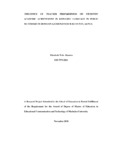| dc.description.abstract | Poor performance of the Kenya Certificate of Secondary Education (KCSE) Examination has been of a great concern by all stakeholders particularly the students’ academic achievement of Kiswahili language. For five years Kathonzweni Sub County has been posting poor results in Kiswahili language. This prompted the researcher to undertake a study in the Sub County. The purpose of the study was to establish the influence of teacher preparedness on students’ academic achievement in Kiswahili language. This study was guided by Teacher Efficacy theory. The study was conducted in Kathonzweni Sub County, Kenya. The target population comprised of 60 Kiswahili language teachers and 39 principals in all the 39 public secondary schools in the Sub County. The Kiswahili language teachers and the principals were purposively sampled. The sample size was all the 39 principals and 60 Kiswahili hence Census Survey. Questionnaires for principals and teachers were used as instruments of data collection. The objectives of the study were; to determine the influence of teacher training on students’ academic achievement on Kiswahili language in public schools in Kathonzweni Sub County, to establish the influence of the teacher’s preparation of professional documents on students’ academic achievement in Kiswahili language, and finally to investigate the influence of teacher’s subject matter knowledge on students’ academic achievement in Kiswahili language in public secondary schools in the Sub County. Both questionnaires were piloted for reliability and yielded Chronbach Alpha Coefficient of 0.833 for principal’s questionnaire and 0.838 for teachers’ questionnaire. The data collected was quantitatively analyzed using Statistical package of Social Sciences (SPSS). Frequencies and percentages were used to summarize and describe data whereas Pearson correlation was used to establish relationships. The findings established that; teacher training had significant influence on students’ achievement on Kiswahili language (r = 0.580, p-value=0.001), teacher’s preparation of professional documents did not have a significant influence (r=0.273, p-value=0.649) and teacher’s subject matter knowledge had significant influence on students’ achievement on Kiswahili language (r=0.618, p-value=0.000). The findings of the study may be useful in advising the Ministry of Education (MOE) on ensuring thorough grounding of teachers in teacher training colleges and universities to produce fully baked Kiswahili teachers. It may also advise MOE on establishment of teacher capacity building Centers to offer refreshers courses for in-service for Kiswahili teachers. It may be used for future researches. It may advise the curriculum developers in the Kenya Institute of Curriculum Development (KICD) to integrate Kiswahili curriculum fully as in English Language. | en_US |

